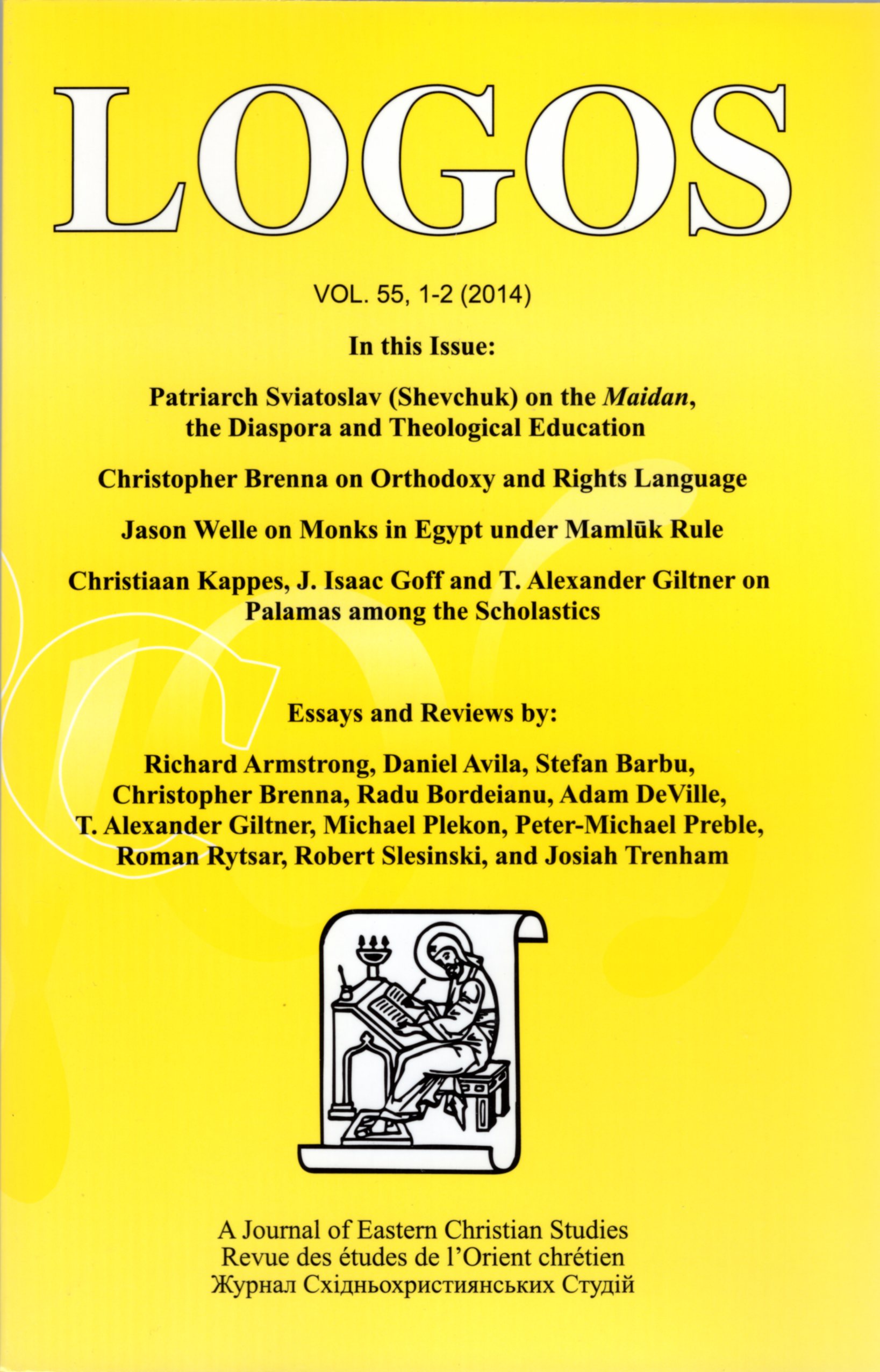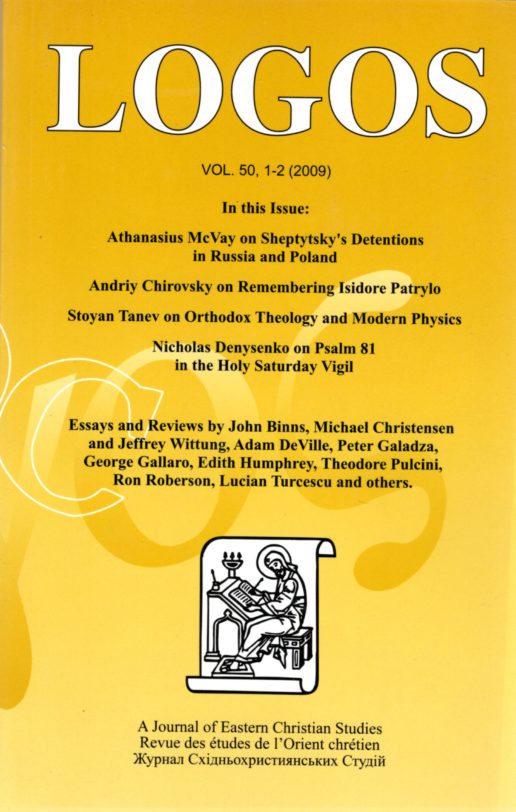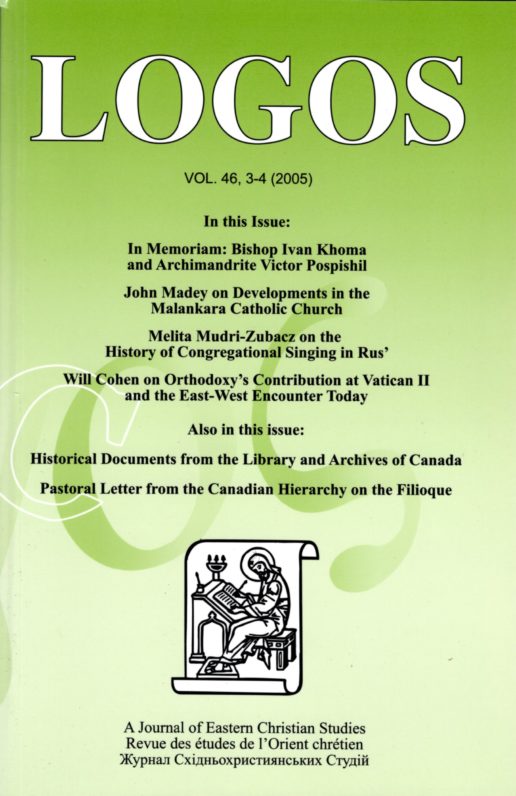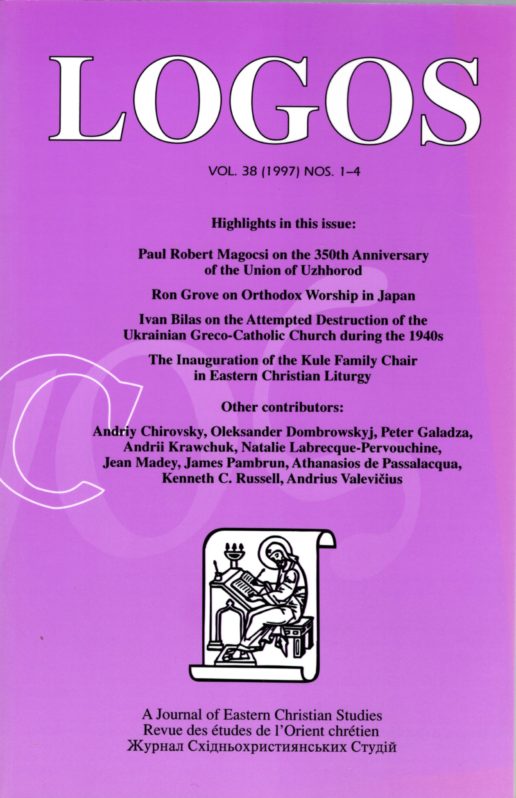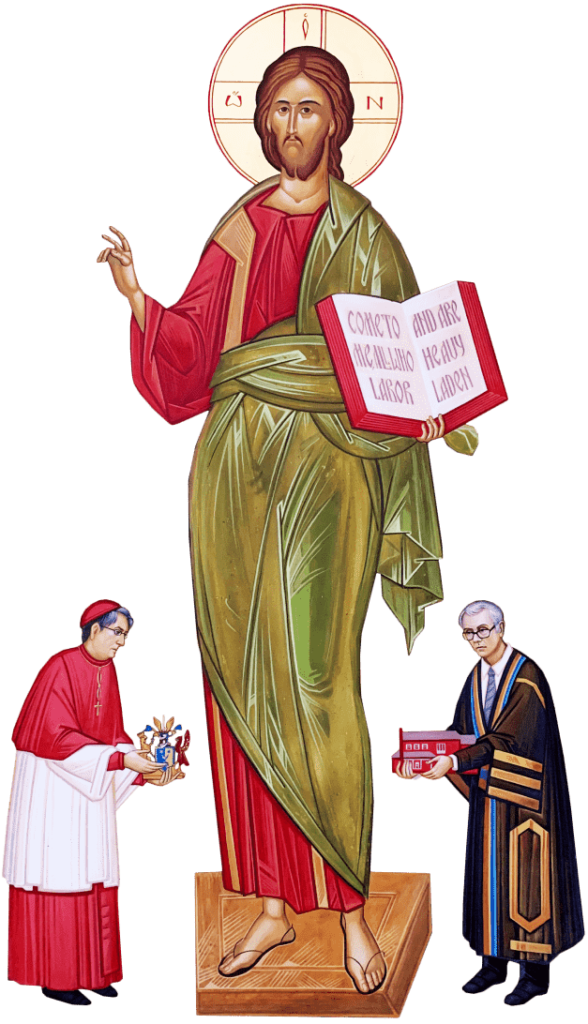Description
Table of Contents (PDF)
In Lieu of an Editorial
Address of His Beatitude Sviatoslav (Shevchuk) at the University of St. Michael’s College in Toronto, May 2, 2014
Articles
The Transfiguration of Rights: A Proposal for Orthodoxy’s Appropriation of Rights Language (PDF sample)
Christopher Brenna
Abstract
The article, building on very recent Orthodox political theology, especially that of Aristotle Papanikolaou and Pantelis Kalaitzidis, brings modern human rights theory into dialogue with Orthodox theology, seeking to bypass “a kind of xenophobia of the West” which has hindered previous attempts at dialogue. The approach is neither an uncritical rejection of rights language nor an unthinking embrace of it, but a careful discerning to see which aspects of human rights theory and practice are reconcilable with Orthodox theology. The author makes expansive use of this rights theory, opening it up, with help from Maximus the Confessor, beyond sociopolitical categories to include ecological questions in a cosmological context. He concludes by calling for further dialogue to more clearly demonstrate that human rights do not represent a threat to the mission of Orthodoxy in the world but a point of connection between the Church and the world.
Резюме
Опираючись на нове православне політичне богослов’я, зокрема Аристотеля Папаніколау і Пантеліса Калайцідіса, автор статті розпочинає діалог між сучасною теорією прав людини та православним богослов’ям, намагаючись обійти “своєрідну ксенофобію Заходу”, що унеможливила попередні спроби почати такий діалог. Цей підхід не є ні некритичною відмовою, ані легковажним прийняттям правової мови, а радше обережним розпізнанням того, які аспекти практики та теорії прав людини є сумісними з православним богослов’ям. Автор широко використовує цю теорію права, виводячи її з допомогою Максима Ісповідника поза соціально-політичну категорію та долучаючи екологічні питання в космологічному контексті. Наприкінці автор закликає до подальшого діалогу, щоби ще краще показати, що права людини не становлять загрози місії Православ’я в світі, а є точкою поєднання між Церквою і світом.
The Status of Monks in Egypt under Early Mamlūk Rule: The Case of Ibn Taymiyya (With an Annotated Translation of Ibn Taymiyya’s Fatwā on the Status of Monks) (PDF sample)
Jason Welle O.F.M.
Abstract
The article examines relations between Christian monastics (firstly Copts and then Franciscans) and Muslims in Egypt during the Mamlūk period (c. 13–14th centuries), concentrating in particular on the controverted and changing status of monastics according to various Islamic legal sources. The questions debated by jurists were especially economic: the taxation of monastics, the ability of Christians generally to set up endowments for broadly social-charitable but not explicitly religious purposes, and the Christian use of lands conquered by Muslims. These questions grew more complex with the arrival of Franciscan mendicants, whose pattern of life did not follow the more stable and residential forms of monastic life common in Coptic practice. Ibn Taymiyya’s Fatwā on monks is analyzed closely, aided by the author’s translation of the same at the end of the article, to shed light on why relatively wealthy Christian endowments were, from 1354 onward, widely confiscated.
Резюме
Автор статті розглядає відносини між християнськими монахами (в основному коптами, а також францисканцями) і мусульманами в Єгипті у період правління мамлюків (13–14 ст.), в особливий спосіб зосереджуючись на суперечливому й непостійному статусі чернецтва згідно з різними ісламськими правовими джерелами. Питання дис кутовані правниками були переважно економічними: оподаткування монахів, можливість для християн органі зувати систему збереження капіталу для різних соціально благодійних (а не стисло релігійних) цілей, а також вико ристання християнами земель, завойованих мусульманами. Ці питання ускладнилися з приходом францисканців (ордену Жебраків), чий спосіб життя зовсім не схожий на притаманне коптам стабільне й зосереджене навколо монастиря монаше життя. Фетву Ібн Таймійа про монахів піддано тісному аналізу, опертому на перекладі тексту від автора, доданому наприкінці статті, що допомагає пролити світло на те, чому від 1354 року доволі часто конфіскувалися порівняно великі християнські благодійні фонди.
Orthodox Ecclesiology in Sophianic Key: An Analysis of Sergei Bulgakov’s Ecclesiological Vision (PDF sample)
Stefan Barbu
Abstract
This article treats the connections between sophiology and ecclesiology, a connection clearly seen in the writings of Sergei Bulgakov, though seldom analyzed there or seen elsewhere. In the present study, after introducing the sophiological question, the author analyzes several key ecclesiological elements Bulgakov addressed in various studies. The present study claims that a re-appropriation of Bulgakov’s ecclesiology might prove salutary both for the modern ecumenical dialogue as well as for the Orthodox Church as such, especially in addressing the growing concerns as to the clericalization of ecclesial processes of governance – synods, diocesan assemblies, and cognate bodies.
Резюме
Автор цього дослідження розглядає зв’язок між софіологією й еклезіологією. Цей зв’язок рідко піддається аналізу, хоча його чітко видно в працях Сергія Булгакова і він нечасто спостерігається в інших авторів. У цій статті автор, представивши спершу софіологічне питання, аналізує кілька ключових еклезіологічних елементів, які Булгаков розглядав у різних працях. Дане дослідження стверджує, що поновне вивчення еклезіології Булгакова може виявитися корисним як для сучасного екуменічного діалогу, так і для самої Православної Церкви, особливо в світлі наростаючих хвилювань щодо клерикалізації церковних процесів управління – Синодів, єпархіальних зібрань та схожих органів.
Notes, Essays, Lectures
Cyril of Jerusalem (c. 313–87): An Ecclesiastical Career in Review (PDF sample)
Richard Armstrong (119)
St John Chrysostom for the Twenty-First Century (PDF sample)
Josiah Trenham (143)
Language, Identity and Inculturation in the Ukrainian Catholic Church (PDF Open Access Article)
Hlib Lonchyna (167)
Review Essays
Palamas among the Scholastics: A Review Essay Discussing D. Bradshaw, C. Athanasopoulos, C. Schneider et al., Divine Essence and Divine Energies: Ecumenical Reflections on the Presence of God in Eastern Orthodoxy (PDF sample)
Christiaan W. Kappes, J. Isaac Goff, and T. Alexander Giltner (175)
On Russian Orthodox Judeologies: A Review Essay Discussing Dominic Rubin, Holy Russia, Sacred Israel: Jewish-Christian Encounters in Russian Religious Thought (PDF sample)
Robert F. Slesinski (221)
Reverencing the Father: A Review Essay Discussing Sergius Bulgakov’s, The Lamb of God, trans. Boris Jakim; The Comforter, trans. B. Jakim; and The Bride of the Lamb, trans. B. Jakim
Robert F. Slesinski (245)
Book Reviews
John Thiel, Icons of Hope: The “Last Things” in Catholic Imagination
Daniel Avila (257)
Boris Bobrinskoy, The Mystery of the Church: A Course in Orthodox Dogmatic Theology, trans.Michael Breck
Radu Bordeianu (259)
Підручний глосарій церковної термінології
Роман Рицар (263)
Briefly Noted (267)
Contributors (277)
Language: English, Ukrainian
Softcover: vi, 294 pages
Publisher: The Metropolitan Sheptytsky Institute of Eastern Christian Studies
ISSN: 0024-5895
Digital File: $19
Size: 4 MB
A link to the PDF file of this title will be sent to you. The PDF file is for your personal use only. You may not copy, share, publish, or sell the file. Protected by copyright of the Metropolitan Andrey Sheptytsky Institute of Eastern Christian Studies.

